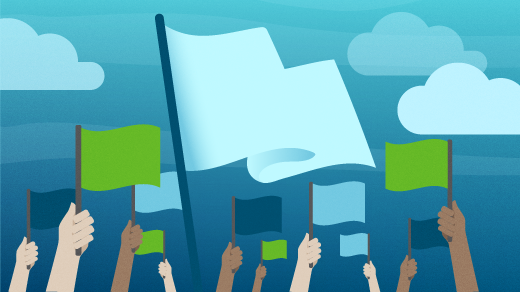Open communities live and breathe. They grow, shift, and change when people join or leave them, learn something new, contribute something different. New contributors step up; long-time contributors take breaks. And the community's dynamics reform every time they do.
Just look at the Open Organization community. For the past five years, we've been helping the world better understand the ways open principles are changing the ways we work, manage, and lead. And we've never stopped evolving.
Now we're undergoing what may be our largest evolution yet. We're reimagining our mission and vision. We're re-branding. We're renovating our spaces of community conversation and collaboration. We're recruiting new contributors. We're implementing new governance structures to make the project more inclusive.
It's incredibly exciting. And in this series, members of the Open Organization project will share the community's journey with you—so you can see firsthand how community evolutions occur, how tough they can be, and how rewarding they become.
Some history
First, a little history.
The catalyst for the Open Organization project was Jim Whitehurst's book The Open Organization, published in 2015. That book reflected a growing, global conversation about the power of open values, principles, and techniques to reshape organizational culture and organizational life.
For the past five years, the Open Organization project has been expanding on the ideas it laid out—defining things that were undefined, contributing knowledge to areas severely lacking in resources. We were defining the tenets of openness and exploring how to advance it inside of global communities and organizations, taking something that Red Hat, Mozilla, Creative Commons, and Wikimedia have embedded into their organizational cultures and extrapolating it back outward, to the rest of the world. We were contributing to open source from an organizational perspective, lending our experience and knowledge of open communities.
Together, we wrote articles and books. We outlined definitions. We crafted some tools. We open sourced it all. The work gained a lot of traction. Open Organization Ambassadors—the community's core contributors—have been spreading knowledge of and passion for open principles to enterprises, schools, and even global non-profits like the International Federation of Red Cross Red Crescent Societies and Greenpeace. They’ve helped Red Hat staff embed these principles into their teams, and they’ve helped countless leaders and open sourcers shift their perspectives on what it means to live and work in the 21st century.
And yet, the community began to feel... stagnant. Core contributors—many who had been with the project from its inception—began feeling like their efforts weren't having the impact they should have been. They were searching for new ways to grow, stretch, and move the project forward.
Simply put, we weren’t all seeing ourselves or our work in the same way; a community with members from diverse backgrounds has an equally diverse set of values and needs, not all of which were being met by the governance and structures originally in place. The situation reminds us of Jono Bacon's comments on "social economy" in communities. In The Art of Community, Jono writes that "a social economy is a collection of processes that describe how something works and is shared between those who participate." The Open Organization project faced a challenge of social economy: What are contributors investing in the community? Why? What were they hoping to earn, or feel as a result of their precious investments (investments of time, energy, passion, and crucial knowledge work).
And was the community structured to catalyze, recognize, and reward those investments?
The (social) economy
These are fundamental questions every community must answer—and re-evaluate as the community itself evolves. They'll lead you to some other important questions, like:
- Why are people contributing to the project? What value(s) do they derive from their participation?
- How is your community addressing issues of social capital?
- How are you highlighting influence—the kudos, the respect, the trust, etc.—that each member has accrued over time, based on interactions with members inside and people outside the community?
It's our turn to ask these questions of ourselves. So we're doing what we do best: implementing open principles to create more transparency and equity amongst our community. Over the coming weeks and months, we will be reinvigorating our community to ensure that the next five years are as beneficial for members as the first five years were. We're committed to ensuring that our community is adaptable and able to serve value to all members, both current and in the future.
This series will consist of open reflections on the process of changing an established community for the better. We're also going to illustrate how to build an open source community as we do it ourselves and as it unfolds. With hope in our hearts and community goodwill in our hands, we'll be taking you along on our adventure.









2 Comments